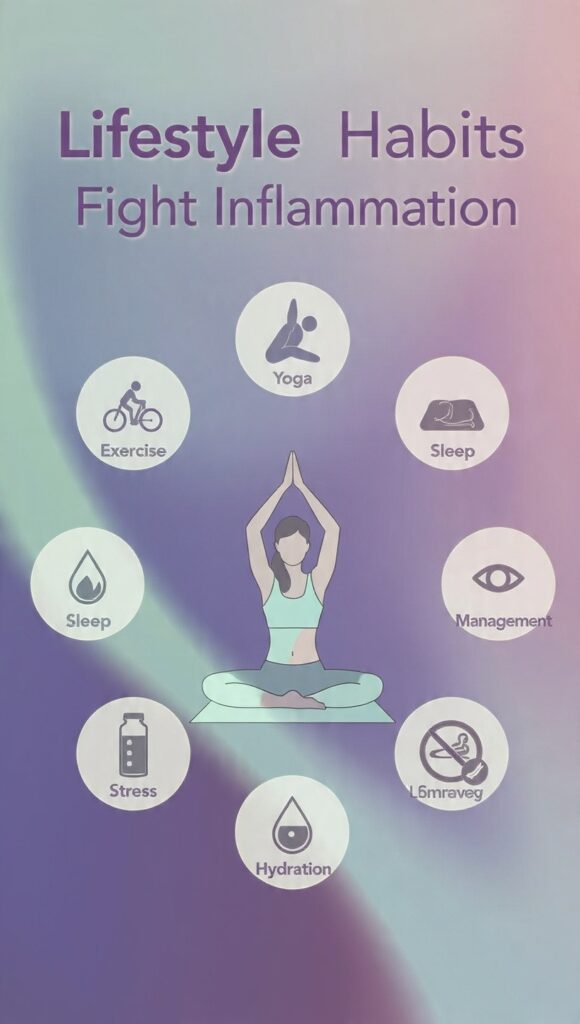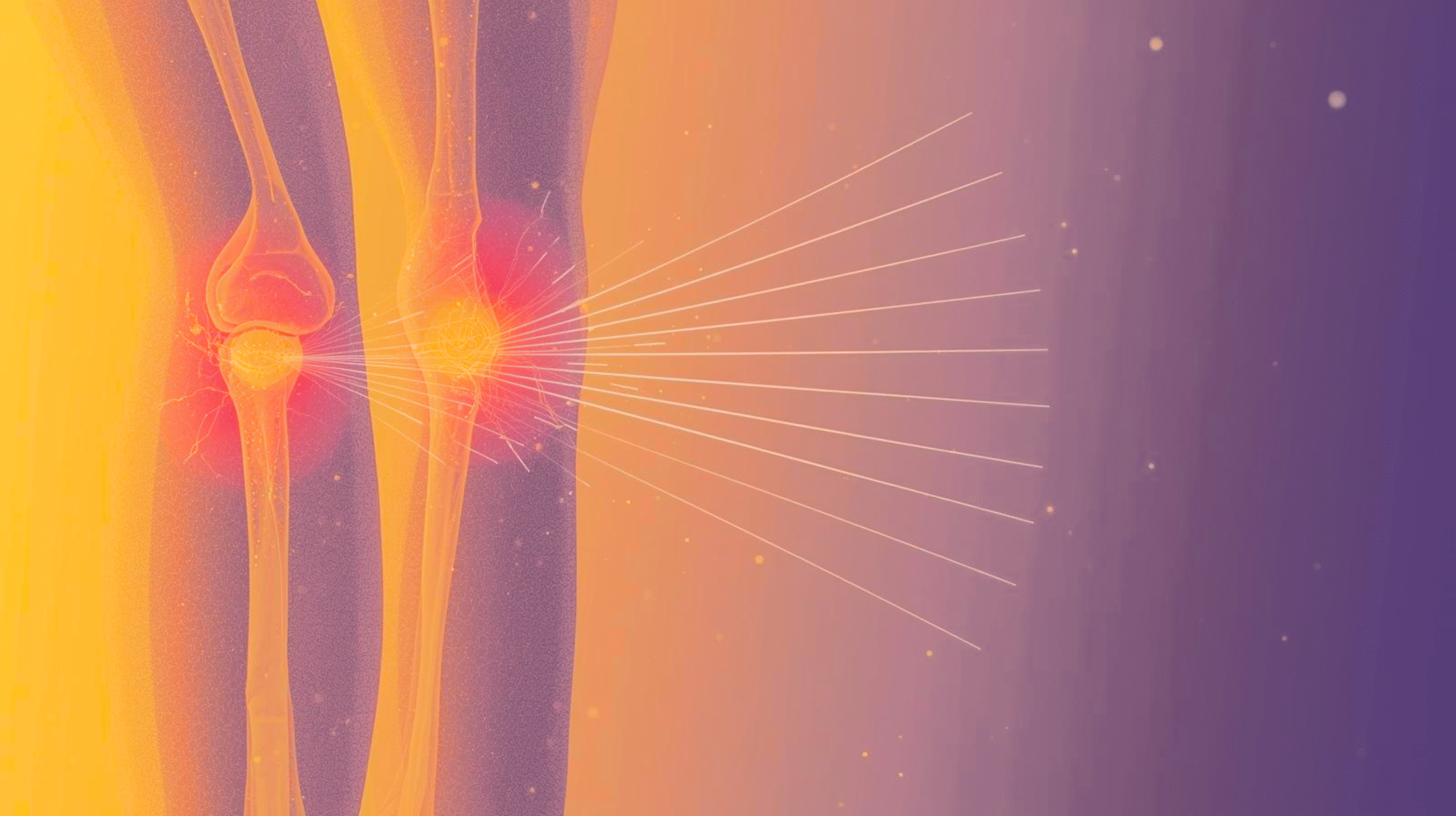Importance of Managing Inflammation for Overall Health
Inflammation is the body’s natural response to damage or infection. However, when it becomes chronic, it can cause a variety of health problems, including joint discomfort, cardiovascular disease, and metabolic abnormalities. Managing inflammation is critical, maintaining overall health and avoiding long-term consequences.
Differences Between Acute and Chronic Inflammation
- Acute Inflammation: It is a short-term response to injury or infection, typically resolving within a few days.
- Chronic Inflammation: It is a persistent, low-grade inflammation lasting for months or years, often linked to lifestyle factors and contributing to chronic diseases.
Consequences of Untreated Inflammation
Chronic inflammation can lead to:
- Joint Pain: Conditions like arthritis and osteoarthritis.
- Cardiovascular Issues: Increased risk of heart disease and stroke.
- Metabolic Disorders: Development of type 2 diabetes and obesity.
- Other Conditions: Including inflammatory bowel diseases and autoimmune disorders.
Understanding Inflammation
What is Inflammation and How It Occurs in the Body
Inflammation is the immune system’s response to harmful stimuli like bacteria, damaged cells, or irritants. It involves immune cell activation, signalling chemical release, and increased blood flow to the affected area.
Signs and Symptoms of Inflammation
Common signs include:
- Redness and warmth at the site of inflammation.
- Swelling and pain.
- Loss of function in the affected area.
Causes: Injury, Infection, Poor Diet, Stress, Lifestyle Factors
Factors contributing to inflammation:
- Injury or Infection: Triggering acute inflammation.
- Poor Diet: High intake of processed foods, sugars, and unhealthy fats.
- Chronic Stress: Elevates cortisol levels, promoting inflammation.
- Lifestyle Factors: Lack of physical activity, smoking, and excessive alcohol consumption.
Safety Tips for Beginners
When starting to address inflammation, beginners should focus on gradual and sustainable changes. Begin with simple lifestyle changes to reduce inflammation, such as improving sleep, hydration, and gentle physical activity. Introduce natural remedies for inflammation like turmeric, ginger, and omega-3–rich foods slowly to monitor tolerance. Avoid extreme diet restrictions or excessive supplementation without guidance. Consistency with an anti-inflammatory diet plan and moderate exercise is more effective than aggressive short-term approaches. If joint pain, swelling, or fatigue persists, consult a healthcare professional early.
Common Stretching Mistakes
Stretching can support inflammation control, but improper techniques may worsen symptoms. Common mistakes include stretching cold muscles without warming up, bouncing during stretches, or pushing into pain—these can increase tissue irritation and inflammation. Overstretching inflamed joints may aggravate joint discomfort rather than relieve it. Another mistake is relying only on stretching while ignoring nutrition and recovery. For best results, combine gentle mobility work with best foods for inflammation relief and balanced movement habits. Learn more about managing joint discomfort through safe, holistic strategies.
Benefits Beyond Flexibility (Pain Relief, Injury Prevention)
Managing inflammation goes beyond improving flexibility. A consistent anti-inflammatory diet plan, combined with movement and stress management, helps reduce chronic pain, joint stiffness, and injury risk. Stretching and mobility exercises improve circulation, delivering nutrients that support tissue healing. Over time, these habits help reduce inflammation naturally, enhance joint resilience, and prevent flare-ups associated with arthritis and overuse injuries. Together, nutrition, movement, and recovery create long-term protection against inflammation-driven health issues.
Anti-Inflammatory Diet and Nutrition
Foods That Reduce Inflammation
Incorporate the following into your diet:
- Berries: Rich in antioxidants like anthocyanins.
- Leafy Greens: Such as spinach and kale, high in vitamins and minerals.
- Fatty Fish: Salmon, mackerel, and sardines provide omega-3 fatty acids.
- Nuts: Almonds and walnuts contain healthy fats and fiber.
- Olive Oil: Extra virgin olive oil is a source of monounsaturated fats and antioxidants.
Foods to Avoid
Limit intake of:
- Processed Foods: High in trans fats and additives.
- Refined Sugars: Found in sugary beverages and snacks.
- Trans Fats: Present in fried and baked goods.
Role of Antioxidants and Phytonutrients
Antioxidants neutralize free radicals, reducing oxidative stress and inflammation. Phytonutrients, found in plant-based foods, have anti-inflammatory properties that support immune function.
Hydration and Its Effect on Inflammation
Adequate water intake helps maintain cellular function and flush out toxins, potentially reducing inflammation.
Natural Remedies for Inflammation
Natural remedies have been used for centuries to help reduce inflammation and support overall health. They often work by modulating the immune system, reducing oxidative stress, and inhibiting inflammatory pathways in the body.
Turmeric and Curcumin
Turmeric contains curcumin, a bioactive compound with strong anti-inflammatory and antioxidant properties. Curcumin works by inhibiting molecules like NF-κB, which regulate inflammatory responses. Studies suggest curcumin may reduce symptoms in conditions like osteoarthritis, rheumatoid arthritis, and even metabolic disorders.
How to use:
- Add turmeric powder to curries, soups, or smoothies.
- Combine with black pepper, which contains piperine, to increase absorption.
- Consider standardized curcumin supplements for therapeutic doses (consult a doctor for dosage).
Scientific insight: Research shows that curcumin can lower markers like C-reactive protein (CRP), a key indicator of chronic inflammation.
Ginger
Ginger contains gingerol, shogaol, and paradol, compounds with anti-inflammatory and antioxidant effects. Ginger can inhibit prostaglandins and leukotrienes, which are chemicals that trigger inflammation and pain.
Practical applications:
- Fresh ginger in tea or smoothies.
- Ginger supplements for chronic inflammatory conditions.
- Ginger can also help reduce muscle soreness after exercise.
Note: People on blood-thinning medication should consult a doctor before consuming high amounts of ginger.
Garlic
Garlic’s sulfur-containing compounds, such as allicin, can reduce inflammation by modulating immune responses and lowering oxidative stress. Regular garlic intake may support cardiovascular health and reduce chronic inflammation.
Tips for use:
- Consume raw garlic or lightly cooked garlic.
- Garlic supplements can be an alternative for those who dislike the taste.
- Works synergistically with other anti-inflammatory foods like turmeric and green tea.
Green Tea
Green tea contains polyphenols, especially EGCG (epigallocatechin-3-gallate), which have anti-inflammatory and antioxidant properties. EGCG reduces pro-inflammatory cytokines and may help prevent chronic diseases like heart disease and certain cancers.
How to include:
- Drink 2–3 cups of green tea daily.
- Green tea extracts or supplements can provide concentrated EGCG for inflammation reduction.
Extra tip: Avoid adding sugar, as it may counteract the anti-inflammatory benefits.
Omega-3 Fatty Acids from Fish or Flaxseed
Omega-3 fatty acids, particularly EPA and DHA, play a key role in regulating inflammation by converting into molecules called resolvins and protectins that actively reduce inflammatory responses.
Sources:
- Fatty fish: salmon, mackerel, sardines
- Plant-based: flaxseed, chia seeds, walnuts
Benefits:
- Reduces joint stiffness and pain in arthritis.
- May lower risk of heart disease by decreasing vascular inflammation.
- Supports brain health by reducing neuroinflammation.
Lifestyle Strategies for Inflammation Relief

Lifestyle factors can significantly influence inflammation. Small, consistent changes can have a profound effect on reducing chronic inflammation over time.
Regular Physical Activity
Exercise helps modulate the immune system and reduce chronic inflammation. It lowers CRP levels and promotes anti-inflammatory cytokine production.
Practical tips:
- Aim for at least 150 minutes of moderate-intensity exercise per week.
- Activities like walking, swimming, cycling, or yoga are excellent for reducing inflammation.
- Avoid overtraining, as intense, prolonged exercise can temporarily increase inflammatory markers.
Stress Management Techniques
Chronic stress raises cortisol, which can trigger inflammation over time. Managing stress is crucial to controlling inflammatory processes.
Techniques:
- Meditation and mindfulness – 10–20 minutes daily can lower inflammatory markers.
- Deep breathing exercises – stimulate the parasympathetic nervous system to reduce stress.
- Yoga and Tai Chi – combine physical movement with stress reduction.
Scientific insight: Studies show that regular mindfulness practice reduces CRP and IL-6, two key inflammatory markers.
Adequate Sleep for Inflammation Reduction
Sleep deprivation increases pro-inflammatory cytokines and contributes to chronic low-grade inflammation.
Tips for better sleep:
- Aim for 7–9 hours of sleep per night.
- Maintain a consistent sleep schedule.
- Limit exposure to screens before bedtime and create a relaxing pre-sleep routine.
Avoiding Smoking and Limiting Alcohol Consumption
Both smoking and excessive alcohol consumption increase oxidative stress and inflammation. Even moderate alcohol intake can elevate inflammatory markers in some individuals.
Recommendations:
- Quit smoking completely.
- Limit alcohol to 1 drink per day for women and 2 for men.
- Focus on water, herbal teas, and anti-inflammatory beverages
Exercise and Physical Activity
Exercise is not just about burning calories; it directly impacts the body’s inflammatory processes.
How Moderate Exercise Reduces Inflammatory Markers
Moderate-intensity exercise reduces levels of pro-inflammatory cytokines and CRP. Muscle contractions during exercise produce myokines, which have anti-inflammatory effects.
Examples:
- Brisk walking for 30 minutes
- Swimming or cycling 3–4 times a week
- Resistance training with light to moderate weights
Importance of Consistency and Gradual Intensity
- Avoid sporadic exercise; regular, consistent activity is more effective at lowering inflammation.
- Gradually increase intensity to prevent injuries and avoid exercise-induced inflammation.
- Combine aerobic and resistance training for best results.
Stretching and Mobility Exercises for Joint Health
- Stretching improves circulation and reduces stiffness.
- Yoga, Pilates, and mobility drills enhance joint function and prevent inflammation-related pain.
- Example: Shoulder circles, hip openers, hamstring stretches, and foam rolling.
Supplements for Inflammation Relief
Supplements can support dietary and lifestyle strategies, especially when anti-inflammatory nutrients are difficult to get from food alone.
Omega-3 Supplements
- Fish oil capsules or algal oil for vegetarians.
- Recommended doses: 1–3 grams per day of combined EPA and DHA.
- Benefits: Reduce joint pain, improve cardiovascular health, and support brain function.
Turmeric/Curcumin Capsules
- Standardized curcumin with piperine increases absorption.
- Typical dose: 500–1000 mg daily.
- Clinical studies show curcumin reduces inflammatory markers and pain in arthritis patients.
Vitamin D and Magnesium
- Vitamin D: Modulates immune response and reduces pro-inflammatory cytokines.
- Magnesium: Deficiency is linked to higher CRP levels.
- Consider supplements if dietary intake is insufficient, especially in low-sunlight regions.
Safety, Dosage, and Timing Considerations
- Always consult a healthcare professional before starting supplements.
- Excessive supplementation can cause side effects or interact with medications.
- Combine supplements with diet and lifestyle strategies for maximum effect.
Managing Inflammation-Related Conditions
Chronic inflammation is a common factor in many diseases. Addressing it can significantly improve quality of life.
Arthritis and Joint Inflammation
- Diet: Anti-inflammatory foods like fatty fish, turmeric, and leafy greens.
- Exercise: Low-impact activities (swimming, yoga) maintain joint mobility.
- Supplements: Omega-3 and curcumin reduce joint pain and stiffness.
Example: Studies show that patients with rheumatoid arthritis taking omega-3s report reduced morning stiffness and joint swelling.
Metabolic Syndrome and Obesity-Related Inflammation
- Chronic inflammation is central to obesity, insulin resistance, and type 2 diabetes.
- Lifestyle strategies: Regular exercise, calorie control, anti-inflammatory diet.
- Weight loss of even 5–10% of body weight can significantly reduce inflammatory markers.
Cardiovascular Inflammation Prevention Strategies
- High inflammation contributes to atherosclerosis and heart disease.
- Prevention tips:
- Mediterranean-style diet rich in olive oil, nuts, fruits, and fish.
- Avoid processed foods and trans fats.
- Maintain healthy blood pressure and cholesterol levels.
Skin Inflammation and Eczema Relief
- Chronic inflammation can manifest as skin conditions like eczema and psoriasis.
- Dietary adjustments: Reduce sugar and processed foods, increase anti-inflammatory foods.
- Topical remedies: Aloe vera, coconut oil, and oatmeal baths reduce skin inflammation.
- Lifestyle: Stress management and sufficient sleep improve skin barrier function.
Common Mistakes in Inflammation Management
- Over-reliance on Medications Without Lifestyle Changes: Medications should complement, not replace, lifestyle modifications.
- Ignoring Chronic Low-Grade Inflammation: Persistent low-level inflammation can lead to chronic diseases if not addressed.
- Poor Diet Choices Despite Healthy Routines: A balanced diet is essential; unhealthy eating habits can undermine other health efforts.
- Lack of Consistency in Exercise and Stress Management: Inconsistent practices can hinder the body’s ability to regulate inflammation effectively.
Creating a Personalized Inflammation Relief Plan
Assessing Risk Factors and Current Inflammation Levels
Consider factors such as age, weight, medical history, and lifestyle to evaluate inflammation risk.
Combining Diet, Exercise, Supplements, and Lifestyle Changes
A holistic approach that includes dietary adjustments, physical activity, appropriate supplementation, and stress management is most effective.
Monitoring Progress and Adjusting the Plan
Regularly assess inflammation markers and adjust the plan as needed to achieve optimal results.
Consulting Healthcare Professionals for Chronic Conditions
Professional guidance ensures that the plan is safe and tailored to individual health needs.
Conclusion
Managing inflammation through natural remedies, dietary choices, exercise, and lifestyle modifications is essential for overall health. By understanding the causes and implementing effective strategies, individuals can reduce the risk of chronic diseases and improve quality of life.
Frequently Asked Questions:
1. What Are the Best Natural Remedies for Inflammation Relief?
Natural remedies include:
- Turmeric/Curcumin: Known for its potent anti-inflammatory effects.
- Ginger: Contains compounds that reduce inflammation.
- Green Tea: Rich in antioxidants that combat inflammation.
- Omega-3 Fatty Acids: Found in fish and flaxseed, they help modulate inflammatory responses.
2. How Does Diet Affect Inflammation in the Body?
A diet high in processed foods, sugars, and unhealthy fats can promote inflammation. Conversely, a diet rich in fruits, vegetables, whole grains, and healthy fats can reduce inflammation levels.
3. Can Exercise Help Reduce Chronic Inflammation?
Yes, regular moderate-intensity exercise has been shown to lower inflammatory markers and improve overall health.
4. Are Anti-Inflammatory Supplements Effective and Safe?
Supplements like omega-3 fatty acids and curcumin can be effective in reducing inflammation. However, it’s important to consult with a healthcare provider before starting any new supplement regimen to ensure safety and appropriate dosing.
5. How Can I Identify Signs of Chronic Inflammation?
Signs of chronic inflammation may include persistent fatigue, joint pain, digestive issues, and skin problems. If you experience these symptoms, consult with a healthcare professional for evaluation and guidance.
References
- Review of anti-inflammatory herbal medicines: “Review of Anti-Inflammatory Herbal Medicines.” PMC. https://www.ncbi.nlm.nih.gov/pmc/articles/PMC4877453
- Editorial on natural products in chronic inflammation: “The Role of Natural Products in Chronic Inflammation.” PMC. https://www.ncbi.nlm.nih.gov/pmc/articles/PMC9099204/
- Foods that fight inflammation: “Foods that fight inflammation.” Harvard Health Publishing. https://www.health.harvard.edu/staying-healthy/foods-that-fight-inflammation Harvard Health
- Anti-inflammatory diet and disease review: “Overview of anti-inflammatory diets and their promising effects on NCD.” PMC. https://www.ncbi.nlm.nih.gov/pmc/articles/PMC11576095/
- Curcumin supplementation review: “Curcumin supplementation and human disease: A scoping review.” PMC. https://www.ncbi.nlm.nih.gov/pmc/articles/PMC10003109/























